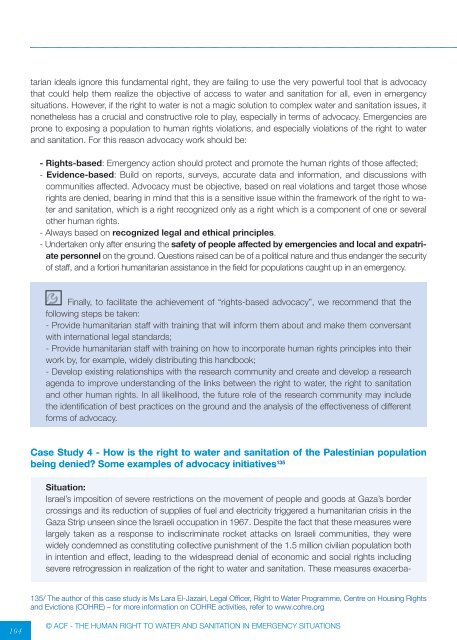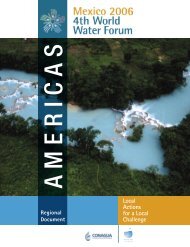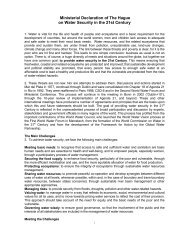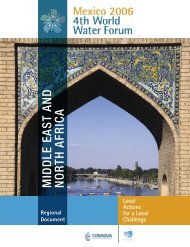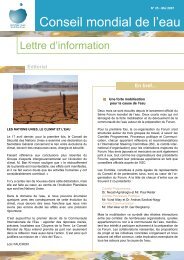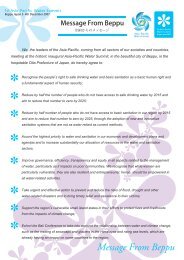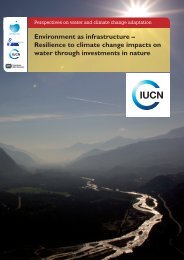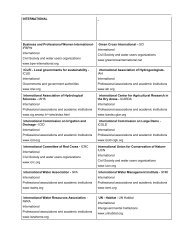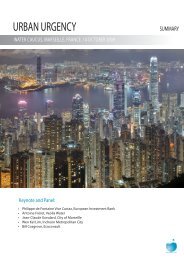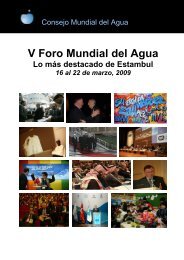the human right to water and sanitation in emergency situations
the human right to water and sanitation in emergency situations
the human right to water and sanitation in emergency situations
Create successful ePaper yourself
Turn your PDF publications into a flip-book with our unique Google optimized e-Paper software.
104<br />
tarian ideals ignore this fundamental <strong>right</strong>, <strong>the</strong>y are fail<strong>in</strong>g <strong>to</strong> use <strong>the</strong> very powerful <strong>to</strong>ol that is advocacy<br />
that could help <strong>the</strong>m realize <strong>the</strong> objective of access <strong>to</strong> <strong>water</strong> <strong>and</strong> <strong>sanitation</strong> for all, even <strong>in</strong> <strong>emergency</strong><br />
<strong>situations</strong>. However, if <strong>the</strong> <strong>right</strong> <strong>to</strong> <strong>water</strong> is not a magic solution <strong>to</strong> complex <strong>water</strong> <strong>and</strong> <strong>sanitation</strong> issues, it<br />
none<strong>the</strong>less has a crucial <strong>and</strong> constructive role <strong>to</strong> play, especially <strong>in</strong> terms of advocacy. Emergencies are<br />
prone <strong>to</strong> expos<strong>in</strong>g a population <strong>to</strong> <strong>human</strong> <strong>right</strong>s violations, <strong>and</strong> especially violations of <strong>the</strong> <strong>right</strong> <strong>to</strong> <strong>water</strong><br />
<strong>and</strong> <strong>sanitation</strong>. For this reason advocacy work should be:<br />
- Rights-based: Emergency action should protect <strong>and</strong> promote <strong>the</strong> <strong>human</strong> <strong>right</strong>s of those affected;<br />
- Evidence-based: Build on reports, surveys, accurate data <strong>and</strong> <strong>in</strong>formation, <strong>and</strong> discussions with<br />
communities affected. Advocacy must be objective, based on real violations <strong>and</strong> target those whose<br />
<strong>right</strong>s are denied, bear<strong>in</strong>g <strong>in</strong> m<strong>in</strong>d that this is a sensitive issue with<strong>in</strong> <strong>the</strong> framework of <strong>the</strong> <strong>right</strong> <strong>to</strong> <strong>water</strong><br />
<strong>and</strong> <strong>sanitation</strong>, which is a <strong>right</strong> recognized only as a <strong>right</strong> which is a component of one or several<br />
o<strong>the</strong>r <strong>human</strong> <strong>right</strong>s.<br />
- Always based on recognized legal <strong>and</strong> ethical pr<strong>in</strong>ciples.<br />
- Undertaken only after ensur<strong>in</strong>g <strong>the</strong> safety of people affected by emergencies <strong>and</strong> local <strong>and</strong> expatriate<br />
personnel on <strong>the</strong> ground. Questions raised can be of a political nature <strong>and</strong> thus endanger <strong>the</strong> security<br />
of staff, <strong>and</strong> a fortiori <strong>human</strong>itarian assistance <strong>in</strong> <strong>the</strong> field for populations caught up <strong>in</strong> an <strong>emergency</strong>.<br />
F<strong>in</strong>ally, <strong>to</strong> facilitate <strong>the</strong> achievement of “<strong>right</strong>s-based advocacy”, we recommend that <strong>the</strong><br />
follow<strong>in</strong>g steps be taken:<br />
- Provide <strong>human</strong>itarian staff with tra<strong>in</strong><strong>in</strong>g that will <strong>in</strong>form <strong>the</strong>m about <strong>and</strong> make <strong>the</strong>m conversant<br />
with <strong>in</strong>ternational legal st<strong>and</strong>ards;<br />
- Provide <strong>human</strong>itarian staff with tra<strong>in</strong><strong>in</strong>g on how <strong>to</strong> <strong>in</strong>corporate <strong>human</strong> <strong>right</strong>s pr<strong>in</strong>ciples <strong>in</strong><strong>to</strong> <strong>the</strong>ir<br />
work by, for example, widely distribut<strong>in</strong>g this h<strong>and</strong>book;<br />
- Develop exist<strong>in</strong>g relationships with <strong>the</strong> research community <strong>and</strong> create <strong>and</strong> develop a research<br />
agenda <strong>to</strong> improve underst<strong>and</strong><strong>in</strong>g of <strong>the</strong> l<strong>in</strong>ks between <strong>the</strong> <strong>right</strong> <strong>to</strong> <strong>water</strong>, <strong>the</strong> <strong>right</strong> <strong>to</strong> <strong>sanitation</strong><br />
<strong>and</strong> o<strong>the</strong>r <strong>human</strong> <strong>right</strong>s. In all likelihood, <strong>the</strong> future role of <strong>the</strong> research community may <strong>in</strong>clude<br />
<strong>the</strong> identification of best practices on <strong>the</strong> ground <strong>and</strong> <strong>the</strong> analysis of <strong>the</strong> effectiveness of different<br />
forms of advocacy.<br />
Case Study 4 - How is <strong>the</strong> <strong>right</strong> <strong>to</strong> <strong>water</strong> <strong>and</strong> <strong>sanitation</strong> of <strong>the</strong> Palest<strong>in</strong>ian population<br />
be<strong>in</strong>g denied? Some examples of advocacy <strong>in</strong>itiatives 135<br />
Situation:<br />
Israel’s imposition of severe restrictions on <strong>the</strong> movement of people <strong>and</strong> goods at Gaza’s border<br />
cross<strong>in</strong>gs <strong>and</strong> its reduction of supplies of fuel <strong>and</strong> electricity triggered a <strong>human</strong>itarian crisis <strong>in</strong> <strong>the</strong><br />
Gaza Strip unseen s<strong>in</strong>ce <strong>the</strong> Israeli occupation <strong>in</strong> 1967. Despite <strong>the</strong> fact that <strong>the</strong>se measures were<br />
largely taken as a response <strong>to</strong> <strong>in</strong>discrim<strong>in</strong>ate rocket attacks on Israeli communities, <strong>the</strong>y were<br />
widely condemned as constitut<strong>in</strong>g collective punishment of <strong>the</strong> 1.5 million civilian population both<br />
<strong>in</strong> <strong>in</strong>tention <strong>and</strong> effect, lead<strong>in</strong>g <strong>to</strong> <strong>the</strong> widespread denial of economic <strong>and</strong> social <strong>right</strong>s <strong>in</strong>clud<strong>in</strong>g<br />
severe retrogression <strong>in</strong> realization of <strong>the</strong> <strong>right</strong> <strong>to</strong> <strong>water</strong> <strong>and</strong> <strong>sanitation</strong>. These measures exacerba-<br />
135/ The author of this case study is Ms Lara El-Jazairi, Legal Officer, Right <strong>to</strong> Water Programme, Centre on Hous<strong>in</strong>g Rights<br />
<strong>and</strong> Evictions (COHRE) – for more <strong>in</strong>formation on COHRE activities, refer <strong>to</strong> www.cohre.org<br />
© ACF - THE HUMAN RIGHT TO WATER AND SANITATION IN EMERGENCY SITUATIONS


